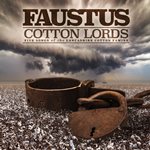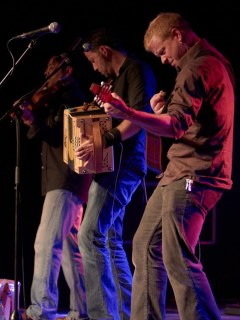
Faustus "Cotton Lords - Five Songs of the Lancashire Cotton Famine", Westpark, 2019

The Lancashire Cotton Famine, also known as the Cotton Famine or the Cotton Panic (1861–65), was a depression in the textile industry of North West England, brought about by overproduction in a time of contracting world markets. It coincided with the interruption of baled cotton imports caused by the American Civil War, and speculators buying up new stock, for storage in the shipping warehouses at the ports of entry.
The boom years of 1859 and 1860 had produced more woven cotton than could be sold and a cutback in production was needed. The situation was exacerbated by an overabundance of raw cotton held in the warehouses and dockyards of the ports and the market was flooded with finished goods, causing the price to collapse, while at the same time the demand for raw cotton fell. The price for raw cotton increased by several hundred percent due to blockade and lack of imports. The inaccessibility of raw cotton and the difficult trading conditions caused a change in the social circumstances of the Lancashire region's extensive cotton mill workforce. Factory owners no longer bought large quantities of raw cotton to process and large parts of Lancashire and the surrounding areas' workers became unemployed, and went from being the most prosperous workers in Britain to the most impoverished.

Local relief committees were set up. They appealed for money locally and nationally. There were two major funds, the Manchester Central Committee and the Mansion House Committee of the Lord Mayor of London. The poorest applied for relief under the Poor Laws, through the Poor Law Unions. Local relief committees experimented with soup kitchens and direct aid. In 1862, sewing classes and industrial classes were organised by local churches, and attendance triggered a Poor Law payment. After the Public Works (Manufacturing Districts) Act 1864 was passed local authorities were empowered to borrow money for approved public works. They commissioned the rebuilding of sewerage systems, cleaning rivers, landscaping parks, and surfacing roads.
In 1864, cotton imports were restored, the mills were put back into production but some towns had diversified and many thousands of operatives had emigrated.
More @ en.wikipedia.org/wiki/Lancashire_Cotton_Famine!
Cotton Lords, Lords of Creation, Feeds the slaves which made your wealth. Is this not a Christian nation? Work's conducive to their health. Though you shut your factory gates, Sell your cotton, stop each loom, Though war is raging in the States, The cotton tree twice yearly blooms. |

Text is available under the Creative Commons Attribution-ShareAlike License.
Date: June 2019.
Photo Credits:
(1)-(3) Faustus
(unknown/website).